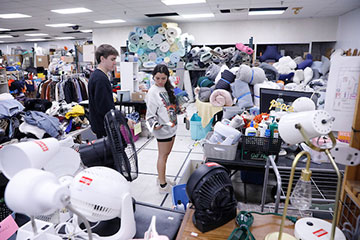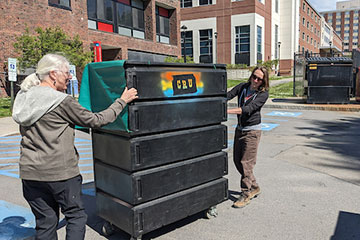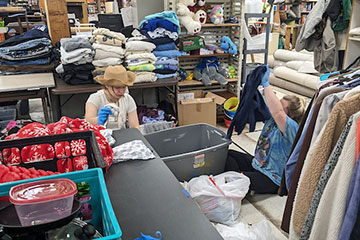
06/17/2024
Call it extra credit for extra items — SUNY Cortland's students may have moved out for the summer, but the things they left behind are still hard at work.
The second year of a partnership between the university and community nonprofit Cortland ReUse is giving those residence hall leftovers a new purpose. This is the second year they’ve helped collect donations.
“There is a massive amount of material going into the landfill unnecessarily,” said John Zelson, Cortland ReUse's volunteer executive director. “We are converting an environmental liability into an asset.”
ReUse collects the unwanted items from residence halls for resale. It also uses some for educational workshops on upcycling and related topics.
“There’s a lot of items that could be used for a very long time that have a short lifespan to a particular individual,” said Justin Neretich, assistant director for operations, residence life and housing.
“There’s just so much opportunity to get something that was going to go sit in a landfill and wasn’t going to degrade and instead get it into the hands of somebody that could really use that item.”
This year’s collection of reusable items exceeded last year’s successful effort. A new warehouse for ReUse helped make it possible to store the larger haul.

“We dedicate about 3,500 square feet of our ReUse Center to processing, sale and distribution of materials and we are still digging out,” he said.
Neretich credited Beth Klein, SUNY distinguished service professor of science education and the university’s sustainability coordinator, and Matt Brubaker, facilities project manager and campus energy manager, for seeing the potential of working with Cortland ReUse.
They brought together custodial staff, other Facilities Management workers and volunteers to implement a program that is valuable for the university, the local environment and wider community, Neretich said.
Zelson noted that during move-out week and three days the following week they had to constantly run trailers through campus from about 8 a.m. to 11 a.m. to pick up all the donated items.
“Their (SUNY Cortland’s) commitment to diverting useful items from the landfill and getting them into the community is inspiring,” he said. “Besides being responsible stewards of resources — which is reason enough — we believe we can minimize mess at dumpsters and reduce the cost to SUNY Cortland associated with disposal.”
In the future, Neretich hopes the program may expand to reach more off-campus students. Although the pickups happen when students are finishing finals and looking toward the summer, more volunteers are always welcome, he added.

Before the current partnership, SUNY Cortland had to throw out more end-of-year items, with some sold at a smaller end-of-semester “garage sale.” Now, the operation is not only bigger, it’s helping support local community needs. Much of the useful material, like lamps and mirrors that would otherwise end up in a landfill, are taken by ReUse, fixed up and then sold at a low price to support the operation.
“Connecting the dots between a person that needs to get rid of something and then providing that item to someone else is the challenging part,” Brubaker said. “Cortland ReUse is helping SUNY Cortland connect those dots with the Cortland Community.”
During the collection, industrial laundry bins placed in residence halls welcome almost all items that students may leave behind when the school year ends. Zelson said that ReUse is happy to take anything the students think would be useful to someone else, even if they don’t fit into the nonprofit’s normal operations, including:
- Nonperishable food. ReUse uses the food to first help restock the SUNY Cortland Cupboard food pantry, then gives the remainder to Seven Valleys Food Rescue and Cortland County Mutual Aid.
- Clothing, linen and textiles. Some clothes may be sold at ReUse, with the rest given to Thrifty Shopper and other groups that help serve the local homeless population. Bedding and pillows go to Mutual Aid.
- Foam bed toppers. This item is a uniquely common one at SUNY Cortland compared to other places ReUse collects from, Zelson said. Thankfully, local community members came to the rescue with advice on how to repurpose these campus mainstays.
- Rough shape rags. Even the most worn-down fabrics can still find a use at the SPCA, where they make the furry residents quite comfortable and happy.
The only request to students is to be sure not to include any perishable items in the donations. Other than that, these donations will be doing good long after the original owners graduate.